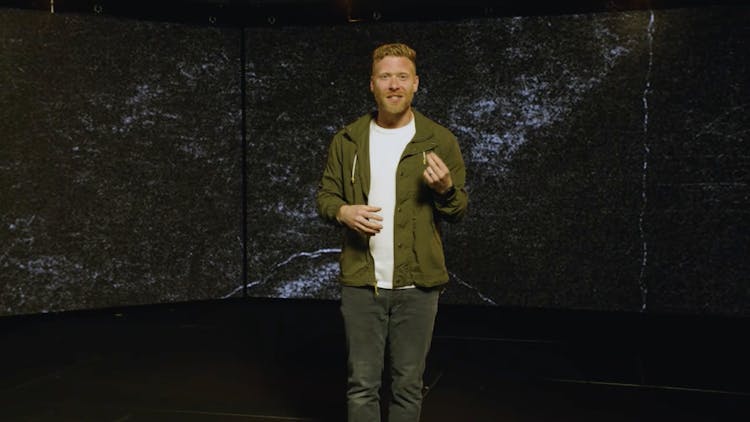A miracle won’t change your life. I know this firsthand.
Christmas, 1996. I wanted a Nintendo 64.
That gift seemed so ridiculously out of reach, I didn’t dare ask for it. Even as a 6th grader, I knew it was well beyond our family’s budget. And yet, against all reason, there it sat under the tree on Christmas morning. There’s an iconic photo in our family from that morning. My brothers and I, arms in the air, celebrating the miracle of 64-bit video games.
My beloved present from Christmas 1996 is sitting in a box in my garage. It’s endured three moves, two states, and about two decades of disuse.
Let me rip the band-aid off: that’s what happens to miracles.
Despite how that sounds, I don’t consider myself a cynical person. I believe in God. I believe in miracles. I believe the Bible is true when it says that Jesus miraculously fed crowds, raised people from the dead, and cured debilitating diseases with a touch of his hand.
But I have to be honest about something. The crowd that ate the miraculous meal was hungry again a few hours later. The little girl that Jesus brought back from the dead didn’t live forever. The men and women cured of diseases got sick again.
The driveway at my house is on a steep slant downward. When my kids play in the driveway, the balls always roll downhill until they slam against the garage. That’s how gravity works. A miracle is God pushing the ball uphill, against what we know, expect, and anticipate. I believe it happens. But left to their own devices, eventually the soccer balls at the top of my driveway will always end up in a pile at the bottom that makes passing through my garage door an exercise in futility.
My children are a miracle. And I don’t mean in the metaphorical life-is-a-miracle kind of way. I mean, their birth was God rolling a ball uphill. I told my story on a podcast recently. You can get all the finer points here.
And although I believe my children are a miracle, I don’t always treat them as such. I get frustrated when they get up with the sun on Saturday morning or work Play-Doh into every crevice of the carpet. I’ve yelled at them, been too hard on them for things beyond their control, and cursed that hungry cry that pulls me out of bed at 3AM. The awe of the miracle fades into the background noise of morning commutes, mortgage payments, and preschool tuition. When God removes his hand, the ball always rolls downhill.
It comforts me that I’m not the only one with miracle memory loss. Over the past month, I’ve interviewed dozens of people who have experienced unexpected healings, prophetic visions, and encounters with the supernatural. Their stories are incredible and documented in the same podcast I referenced above. But I uncovered an unexpected common denominator in the process: the miracle fades. Unbelief returns. Doubt seeps in. Fear comes back to the party. The ball and the hill, right?
After an hour-long interview, one of the guests on the new podcast made a passing remark that stuck with me.
“Thanks for letting me do this,” he said. “I needed to remember that.”
This guest’s story, mind you, is one of the most profound spiritual encounters I’ve ever heard about first-hand. And this guy forgets it. Routinely.
Miracles aren’t enough. A miracle answered won’t set you on a path to spiritual health and vitality. And a miracle unanswered shouldn’t become the foundation for turning your back on God. Why? Let’s talk about disfiguring skin diseases.
While easily treated today, leprosy was a nasty deal in Jesus’ day. The bacterial infection would result in unsightly skin lesions and the inability to feel pain. It would progress to grotesque complications such as the loss of extremities due to repeated injury or infection from unfelt wounds. The social stigma around it was just as devastating. Leprosy was believed to be highly contagious at the time, so lepers were pushed out of society into makeshift camps on the outskirts of town. To be diagnosed as a leper meant the loss of everyone and everything you held dear.
One day, while traveling into Jerusalem, Jesus passed one of these colonies. Ten lepers call out to him, begging for a miracle. Jesus tells the men to go into the city and show themselves to the priests. The assumption is that when they arrive, the official will find their disease cured and give them the right to return to society. Who knows how long these men had been ostracized from their families, friends, and normal life? The ten men immediately set out, propelled by hopes and dreams of returning to their homes.
And a miracle occurs. While the men travel, their skin begins to heal. Their disease is cured. What is the response of the ten? A ball rolling downhill. Nine of the cured lepers immediately return to the normalcy of everyday life. Only one breaks the mold.
One of them, when he saw that he was healed, turned back, praising God with a loud voice; and he fell on his face at Jesus’ feet, giving him thanks. Luke 17:15-16
Only one out of ten was able to see through the miracle. Just one took the time to give thanks and adoration where it was due. Only one valued the giver over the gift.
And that’s why your miracle—the one you’re currently asking for, or one you’ve experienced in the past—won’t be enough.
It won’t get you through difficult times. It won’t pave a nice path for you to walk down. It won’t change your life. Because you weren’t created to love the gift. You were created to love the giver.
On Christmas morning in 1996, a Nintendo 64 sat under my Christmas tree. I knew that my parents loved me—they met a desire I wasn’t even able to express in words. But even without the gift, I would have known my parents loved me. Even if we had had a Christmas without any presents at all, their love would still have been impossible to ignore. Gifts may express love, but they are never strong enough to cause it.
I believe God wants to provide you something much more valuable than a miracle. He wants to give you quality time. Affirmation. Trust. Belief. Even discipline. He wants to give you love. And that will change your life in a way that no miracle can.
Have a hard time believing in miracles? Forward this article to a friend who does and ask for their reaction to it.
Experienced what you believe is a miracle in the past? Take a cue from the one leper and spend time thanking God for it.
Disappointed from a miracle that didn’t occur? Tell God. Then spend time thanking him for everything that comes to mind - the ordinary and the extraordinary.
Praying for a miracle that hasn’t been answered yet? Give the outcome to God. Make a list of the all the things God has given you in the past.
Focus your love on the giver, not the gift.











